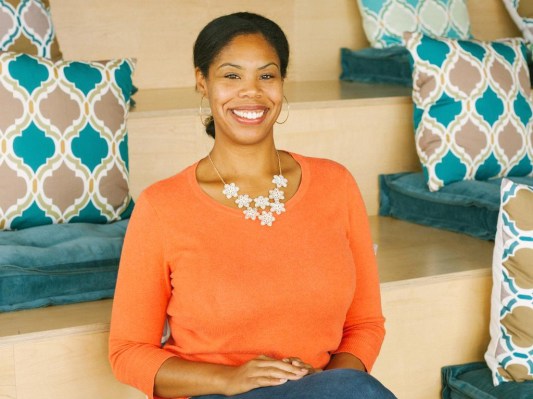Erica Baker, a build and release engineer at Slack, is making waves in tech right now. She’s the ex-Google employee who released employee salary data at Google. She’s also the one behind #RealDiversityNumbers, a Twitter movement to get companies reporting numbers around retention, number of lawsuits settled out of court, etc. And just this week, Re/Code’s Kara Swisher told C Magazine that Baker’s a woman to watch.
And now, from her latest, thoughtful post on Medium, #FFFFFF Diversity:
Marc and Parker’s words echoed the message many Silicon Valley companies have been saying with money: Get in line people of color. Wait for (white) women to get theirs, then we’ll get to you.
Baker was referring to the chat Salesforce CEO Marc Benioff and Co-Founder Parker Harris had about diversity with Swisher at the company’s annual Dreamforce conference in San Francisco last month. The panel was originally called “Building an Inclusive Workplace,” but was renamed to “Advancing Women in the Workplace” after the conversation ended with a sharp focus on women. In case you missed it, Harris said, “right now, I’m focused on women” and Benioff said, that while overall diversity is important, Salesforce’s “major focus right now” is “the women’s issue.”
Baker’s advice to Salesforce: “Stop acting like you don’t have resources,” Baker told TechCrunch. “To say that ‘We can’t focus on anything else but women right now’ is such a cop-out.”
Despite what Harris and Benioff said at Dreamforce, Salesforce says that it’s committed to addressing other forms of diversity, such as ethnic diversity.
“There has been a big spotlight on women and issues like equal pay, and we have focused more on women in our diversity efforts, but not exclusively,” Salesforce EVP of Global Employee Success Cindy Robbins said in a statement to TechCrunch. “Salesforce has many other initiatives to create a more diverse workforce across the board. We are still learning and committed to addressing gender and ethnic diversity.”
Yes, Salesforce is clearly still learning, as is everyone else. And, even though it’s not the responsibility of black people and people of color to teach white people, Baker is willing to help. She doesn’t work in any diversity and inclusion departments at Slack, but she’s motivated to keep speaking up about the absence of people of color in tech.
“If we don’t talk about it, if we accept the status quo as is, like, ‘Oh, it’s ok to just focus on women for our diversity efforts.” If we just let that be, then that’s all a company is going to do,” Baker said. “Let’s be honest, they’re going to do the bare minimum because it’s not a thing they want to deal with anyway.”
Baker made it a point to tell me that what she’s saying is not anything new. Inside of private groups on Facebook and such, black women — myself included — are talking about these issues with each other. The only difference, Baker said, is that she’s able to say it loudly.
“I don’t have a concern that if I speak out about stuff that is a little bit controversial, that it’s going to have a negative effect on my job,” Baker said. “That’s a privilege that I have. That’s a huge privilege. A lot of people don’t have that. Like, if they speak out, there’s a likelihood they’ll get fired. It’s a shitty thing, but it’s a real thing in their jobs, for other people. I don’t have that, so I’m going to make use of that privilege. This needs to be talked about, so we’re going to talk about it. It’s going to be a topic — I’m going to make it one.”
Also, if companies really want to know how their diversity efforts are going, they should reach out to black women, Baker said.
“We are the ones in the people of color group and in the women’s group. We are the ones who can see everything. And not just black women, but hispanic women. Women of color. We can see what’s going on. We will tell you the truth. Let a woman of color be honest with you about what’s going on and you’ll learn.”
